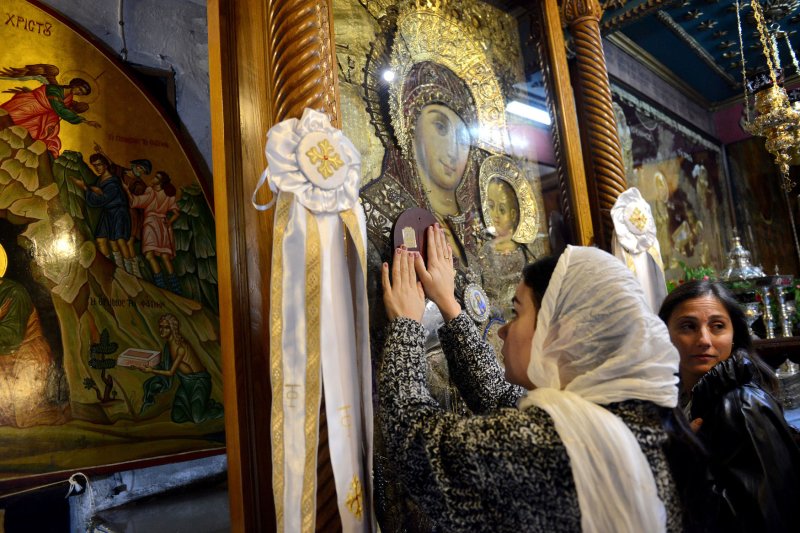1 of 12 | Christian pilgrims pray in front of an icon of the Madonna and Child in the Church of Nativity, where tradition believes Jesus Christ was born, in Bethlehem, West Bank, Dec. 18. Palestinian officials say the number of tourists has significantly dropped since the Israeli-Gaza war in the summer. Photo by Debbie Hill/UPI |
License Photo
BETHLEHEM , West Bank, Dec. 24 (UPI) -- In the contradictory little town of Bethlehem, the hotels are full this Christmas, tourism is down and the pastoral community of olive groves needs some traffic relief.
Bethlehem is not, in reality, the place of wistful Christmastime nostalgia, as the crush of tourists will see this week. It is a densely packed municipality of about 25,000 people in four square miles, overwhelmingly Muslim despite its place in Christian tradition, and although six miles south of Jerusalem, Israel, is in the Palestinian-controlled West Bank.
Full of shrines, artisan shops and traffic gridlock around the Church of the Nativity, beneath which Jesus was said to be born, Bethlehem carries its worldly, cosmopolitan history like baggage. Filmmaker and Bethlehem resident Leila Sansour refers to it as "the rock-and-roll town of Palestine, with several nightclubs that on Saturdays attract flocks of youngsters from Jerusalem, Ramallah and Hebron."
At Christmas it attracts the world's Christians, just fewer this year because of the summer's Gaza war and the idea that militants of the Islamic State are ready to invade. Although tens of thousands of tourists annually visit Bethlehem at Christmas, 60 percent of accommodations bookings were canceled in Palestine after the summer's 50-day war, Palestinian Tourism Minister Rula Ma'ayah told NBC News.
"Tourism is the only lifeline for the city, so if you care about sustaining Bethlehem's livelihood it is very, very key, economically, politically and culturally. A whole culture that dates back to biblical times is dying," Sansour said.
A planned extension of a wall between Israel and Palestine, ostensibly to protect Bethlehem from terrorism, would be "the last suffocation of Bethlehem," the town's mayor, Vera Baboun, said.
The Christmas season will go on as planned, though. Maher Qanwati, owner of Bethlehem's Saint Michael Hotel, told NBC News bookings fell 70 percent from September to November, compared to last year, and foreign bookings for the week of Christmas are 40 percent below normal. His hotel will be filled this week with Christian Arabs from Israel, instead of the traditionally bigger spenders from abroad.
"There are no tourists. It's been this way for half a year, but we understand the hotels are full for Christmas, so that's a glimmer of hope," said Bethlehem storekeeper Louis Michel. "People have been scared away. We've never experienced such a sustained drought of pilgrims."
It is expected that 750,000 Christians from around the world will visit Israel this Christmas, a decrease of 1 percent from 2013 and part of a 7 percent drop since 2013 of all tourists. Christians represent 53 percent of all incoming tourists, the Israeli Ministry of Tourism reported.
"Even the stories of ISIS [Islamic State], even though it is so far away from us in day-to-day life, it influences people in the U.S.A. and Europe. It is very hard to have people understand this. We easily brand an entire region with the terror of one fact," Father Eamon Kelly of Jerusalem's Notre Dame Center told the Jerusalem Post.
Israeli citizens traveling to Bethlehem have few entry problems. "They don't mind us getting in, they just don't want us getting out," said Afif Hazboun, 48, a Bethlehem-born Catholic from Nazareth who annually uses Christmas week in Bethlehem as a family reunion. He added the return trip to Israel typically involves a search of his car and family belongings at a busy Israeli checkpoint, and last year, body searches.
"It was disgusting," Hazboun said. "I am an Israeli citizen, and even if I wasn't they should respect people."
Bethlehem's largest industry is not religion but tourism. It has 135 registered shops selling carved olive wood; convention holds pilgrims from Renaissance Italy trained local artisans in the 16th and 17th century, and that tradition is upheld in Bethlehem today to the point olive wood is becoming a scarce raw material because of demand for local sculpture as souvenirs, and the destruction of olive trees for Israel's local settlements and infrastructure.
"I haven't been able to sell what I already have. It's difficult for me, but also for the many families here who rely on the income from the local factories," said Michel, the shopkeeper, noting this was the first year he had not restocked his inventory in preparation for the Christmas season.
Bethlehem this Christmas, then, is the same as always and something new; so crowded a $4.9 million traffic tunnel under Manger Square, site of the Church of the Nativity, is under consideration to relieve gridlock, and the conclusion of a year of depressed income and canceled plans.















